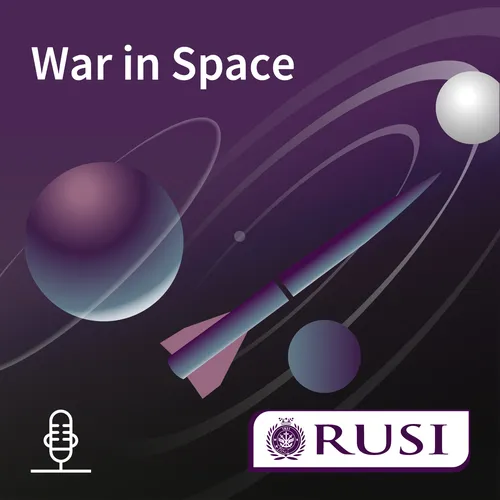
War in Space
Space is becoming increasingly congested, contested and competed over. It has never been so easy – or so cheap – to launch a satellite into orbit. With space activity proliferating, its impact on national security has grown too: space assets are becoming vulnerable and space debris is becoming increasingly dangerous. War in Space is a series of interviews with experts in space and defence that will analyse the intersection of space and national security, unravelling the technical jargon that so often accompanies these discussions and explaining why space matters for our everyday lives and security.
The views or statements expressed by guests are their own and their appearance on the podcast does not imply an endorsement of them or any entity they represent. Views and opinions expressed by RUSI employees are those of the employees and do not necessarily reflect the view of RUSI.
- Update frequency
- every 24 days
- Average duration
- 27 minutes
- Episodes
- 48
- Years Active
- 2021 - 2024

Episode 47: War in Space is Not Inevitable
US Space Command was re-established in 2019, with responsibility for all military operations in outer space. But how much adversarial competition are we actually seeing in this domain?
General Stephe…

Episode 46: Space ‘Olympics’: A Gold Medal for the US?
The US is the undisputed predominant space power. But for how long?
While Western private companies such as Space X are entering and often dominating the space sector, China’s space power is also inc…

Episode 45: 'Zeitenwende' in Space?
How does space power fit into German defence thinking, and has this changed since German Chancellor Olaf Scholz called for a ‘Zeitenwende’ in 2022?
When Chancellor Scholz addressed the nation shortly…

Episode 44: Not All That Orbits is Gold: Space Debris
We hear about the dangers of space debris all the time – the high velocities with which discarded or disused manmade objects travel around the Earth and the threat that high-speed impacts, even of sm…

Episode 43: Europe in Space
There is no pan-European approach to space. Instead, there is a diverse set of European actors, agencies and infrastructures that are making a mark on the final frontier.
Who exactly is involved in t…

Episode 42: Eyes in Orbit: Space Situational Awareness
Keeping track of satellites requires space situational awareness (SSA). But how does one acquire this information, and how subjective is the data that we receive?
Sean Goldsborough, Business Leader a…

Episode 41: The Accelerating Pace of the Space Industry
Space launches in 2024 are routine events – new satellites enter orbit on a weekly basis, and the industry is changing fast.
In this episode, we examine the increasing commercialisation of space and …

Episode 40: UK Space Command: Lessons Learned
After three years of setting up and running UK Space Command, Air Vice Marshal Paul Godfrey joins us to discuss the lessons learned and explains why setting up the Command felt a bit like running a s…

Episode 39: Space Sector Capture: How to Make Allies and Influence States
Does a state's power on Earth translates into influence in orbit – and vice versa? Dr Jana Robinson, Managing Director of the Prague Security Studies Institute, presents her research on what she call…

Episode 38: The Responsible Behaviours Report
Multilateral efforts to prevent an arms race in outer space have been going on for decades. The most recent efforts include a UN resolution that intended to solve existing gridlocks by getting states…

Episode 37: No Wild West: An Introduction to Space Law
There is a persistent perception that space is a lawless place. Professor Steven Freeland, Emeritus Professor of International Law at Western Sydney University and Professorial Fellow at Bond Univers…

Episode 36: Are We Running Out of Space?
Orbits are getting busier, frequencies are taken up, collisions are becoming likelier and the resulting space debris is endangering satellites ... are we really running out of space in space?
John Ja…

Episode 35: Concepts of Warfare in Space
How do concepts of warfare apply to space? Is there such a thing as irregular warfare, asymmetric tactics or hybrid warfare in space? Dr John 'Patsy' Klein, Senior Fellow and Strategist at Falcon Res…

Episode 34: The Future of Skynet
The Skynet Satellite Communications Programme is the UK's biggest space project; having started in the 1960s, it is currently in its sixth generation. Dr Richard Davis, Programme Director of Skynet 6…

Episode 33: Talking Through Space
Space-enabled communications are vital to modern military operations. But it's not just the military that benefits from satellite communications; it's also governments, doctors and other emergency fi…

Episode 32: NATO’s Air and Space Lessons from Ukraine
Are we back to counting tanks and trenches? Do the air and space domains matter in the context of the war in Ukraine? Air Marshal Johnny Stringer, Deputy Commander of NATO's Allied Air Command at Ram…

Episode 31: Indian Space Policy
Compared to the likes of the US, Russia and China, India's place among the preeminent space powers is often forgotten, despite its rich history in the domain dating back to the 1950s. Dr Namrata Gosw…

Episode 30: Russia: First into Space, and the First Out?
Russia was the first nation to enter space with satellite 'Sputnik' in 1957. Now, however, the Russian space industry seems to struggle to even maintain its current constellations, let alone contribu…

Episode 29: Moving from Geopolitics to ‘Astropolitics’
Tim Marshall, author of the Prisoners of Geography series, joins us to discuss the geopolitics of space – ‘astropolitics’. But what is astropolitics exactly? And in the geography of space, what are t…

Episode 28: To Own, or to Collaborate and Access? That is the Question
Is the UK taking the space threat seriously? How does one protect space assets from threats and balance reliance on commercial providers with the ’price point’ and broader financial burdens inherent …